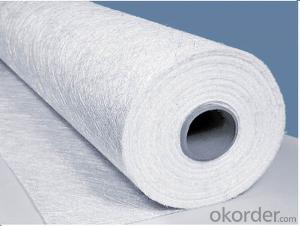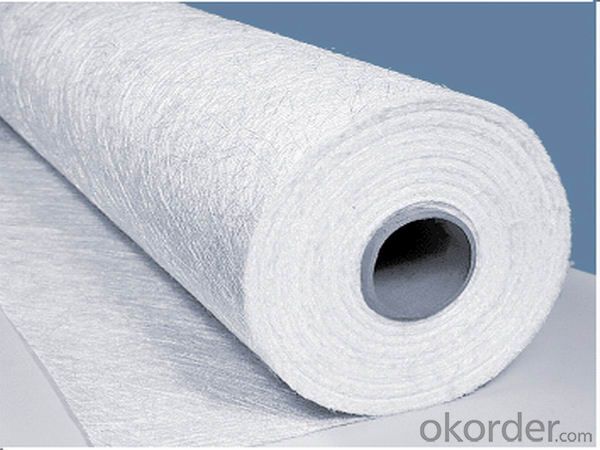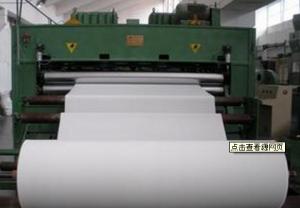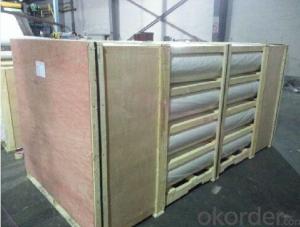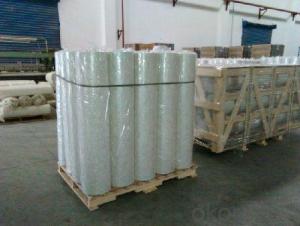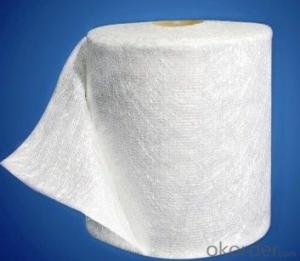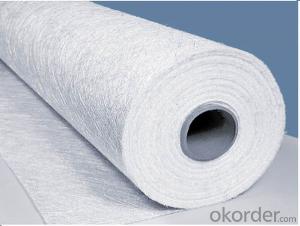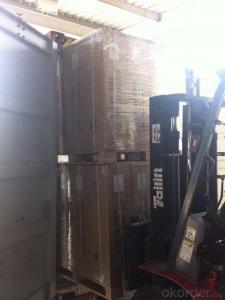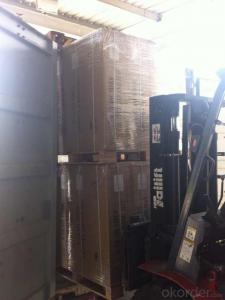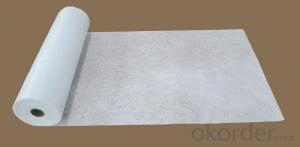Fiberglass Mat Tissue - e-glass fiber chopped strand mat (emulsion bonded)
- Loading Port:
- Shanghai
- Payment Terms:
- TT or LC
- Min Order Qty:
- 20000 kg
- Supply Capability:
- 200000 kg/month
OKorder Service Pledge
OKorder Financial Service
You Might Also Like
Description:
E-Glass Emulsion Chopped Strand Mat is made of randomly distributed chopped strands held tighter by a emulsion binder. It is compatible with UP, VE, EP resins.It is compatible with UP, VE, EP, PF resins.The roll width ranges from 50mm to 3300mm.
Additional demands on wet-out and decomposition time may be available upon request.
It is designed for use in hand lay-up, filament winding, compression molding and continuous laminating processes. Its end-use applications include boats, bath equipment, automotive parts, chemical corrosion resistant pipes, tanks, cooling towers and building components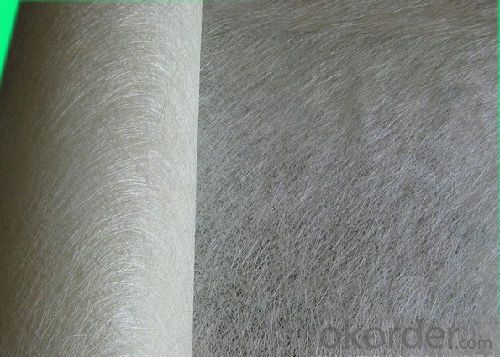
Product Features:
Fast breakdown in styrene
High tensile strength, allowing for use in hand lay-up process to produce large-area parts
Good wet-through and fast wet-out in resins, rapid air lease
Superior acid corrosion resistance
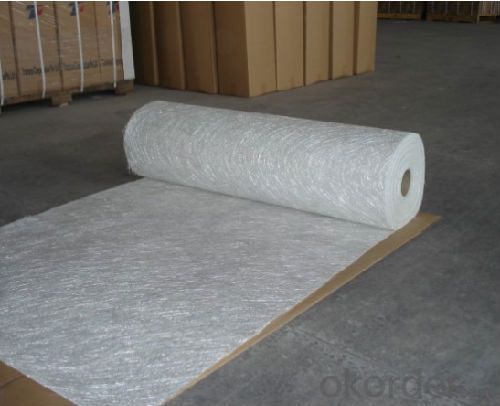 Product Specifications:
Product Specifications:
Property | Area Weight | Moisture Content | Size Content | Breakage Strength | Width |
(%) | (%) | (%) | (N) | (mm) | |
Mathods | IS03374 | ISO3344 | ISO1887 | ISO3342 | |
EMC80E | ±7.5 | ≤0.20 | 8-12 | ≥40 | 50-3300 |
EMC100E | ≥40 | ||||
EMC120E | ≥50 | ||||
EMC150E | 4-8 | ≥50 | |||
EMC180E | ≥60 | ||||
EMC200E | ≥60 | ||||
EMC225E | ≥60 | ||||
EMC300E | 3-4 | ≥90 | |||
EMC450E | ≥120 | ||||
EMC600E | ≥150 | ||||
EMC900E | ≥200 |
Packaging:
Each Chopped Strand Mat is wound onto a paper tube which has an inside diameter of 76mm and the mat roll has a diameter of 275mm. The mat roll is wrapped up with plastic film,and then packed in a cardboard box or wrapped up with kraft paper. The rolls can be vertically or horizontally placed. For transportation, the rolls can be loaded into a cantainer directly or on pallets.

FAQ:
1.What is the delivery time ?
15days after receiving the deposit
2.Are you a trading company or factory.
We are factory,and we have more than 10 years of experience.
- Q: Is fiberglass mat tissue chemically resistant?
- Yes, fiberglass mat tissue is chemically resistant.
- Q: Can fiberglass mat tissue be used for electrical transformers?
- No, fiberglass mat tissue cannot be used for electrical transformers. Electrical transformers require materials with specific electrical insulating properties, such as paper or oil-impregnated materials, to ensure efficient and safe operation.
- Q: Can fiberglass mat tissue be used for architectural facades?
- Yes, fiberglass mat tissue can be used for architectural facades. Fiberglass mat tissue is a lightweight and flexible material that is commonly used in various construction applications, including architectural facades. It offers several advantages such as high strength, durability, weather resistance, and fire resistance. Additionally, fiberglass mat tissue can be easily molded into different shapes and sizes, making it suitable for architectural designs that require unique and intricate facades. Its versatility and aesthetic appeal make it a popular choice among architects and designers for creating visually appealing and functional facades.
- Q: Can fiberglass mat tissue be used for reinforcing fiberglass pools?
- Fiberglass mat tissue is indeed suitable for reinforcing fiberglass pools. This product, known for its thin and flexible nature, is widely utilized in the construction and repair of fiberglass structures, including pools. Comprising delicate glass fibers bonded together with a binder, the mat tissue offers added strength and reinforcement when applied to the pool's surface. By doing so, it effectively prevents cracks and damage. Typically, it is used in conjunction with fiberglass resin, which acts as an adhesive to securely attach the mat tissue to the pool surface. The practice of utilizing fiberglass mat tissue for reinforcing fiberglass pools is widely adopted, as it significantly increases the pool's lifespan and durability.
- Q: Can fiberglass mat tissue be used in wet environments?
- Yes, fiberglass mat tissue can be used in wet environments. Fiberglass mat tissue is designed to be resistant to moisture and can withstand exposure to water, making it suitable for applications in wet environments. It is commonly used in industries such as construction, marine, and automotive, where components or structures are exposed to water, humidity, or moisture. The material's resistance to water ensures that it maintains its structural integrity and does not degrade or lose its performance properties when subjected to wet conditions.
- Q: What is the weight range of fiberglass mat tissue?
- The weight of fiberglass mat tissue can vary depending on the specific product and its intended application. Typically, the weight range of fiberglass mat tissue can be anywhere from approximately 20 grams per square meter (gsm) to over 100 gsm. Thinner and lighter fiberglass mat tissues are commonly employed for insulation purposes or as a reinforcing layer in composite materials. On the other hand, heavier fiberglass mat tissues are generally utilized for more demanding applications like roofing or flooring. It is worth noting that the weight range may also be influenced by factors such as the type of resin used, the desired strength or stiffness of the final product, and any specific requirements or specifications for a particular project.
- Q: How does fiberglass mat tissue compare to other reinforcing materials, such as carbon fiber or kevlar?
- Fiberglass mat tissue, carbon fiber, and Kevlar are all reinforcing materials commonly used in various industries for their high strength and durability. However, they differ in their composition and properties, leading to different applications and performance characteristics. Fiberglass mat tissue is made from fine glass fibers randomly oriented and bonded together with a binder. It offers excellent tensile strength, corrosion resistance, and low cost, making it widely used in construction, automotive, and marine industries. Fiberglass mat tissue is also highly flexible, allowing it to conform to complex shapes easily. However, it may not have the same strength-to-weight ratio as carbon fiber or Kevlar. Carbon fiber is composed of thin strands of carbon atoms tightly woven together, resulting in an extremely strong and lightweight material. It has a higher tensile strength than fiberglass mat tissue, making it suitable for applications where weight reduction and high strength are critical, such as aerospace, sports equipment, and automotive components. Carbon fiber also has excellent stiffness and fatigue resistance, but it is more expensive compared to fiberglass mat tissue. Kevlar, on the other hand, is an aramid fiber known for its exceptional strength-to-weight ratio and resistance to impact and abrasion. It is often used in applications where high impact resistance is required, such as bulletproof vests, helmets, and protective clothing. While Kevlar is stronger than fiberglass mat tissue, it is not as rigid as carbon fiber and may not offer the same level of stiffness. Kevlar is also more expensive than fiberglass mat tissue but less expensive than carbon fiber. In summary, fiberglass mat tissue, carbon fiber, and Kevlar each have their own unique characteristics and advantages. Fiberglass mat tissue is versatile, cost-effective, and flexible, while carbon fiber offers exceptional strength and stiffness. Kevlar excels in impact resistance and durability. The choice of reinforcing material depends on the specific application requirements, cost considerations, and desired performance characteristics.
- Q: Is fiberglass mat tissue suitable for oil and gas applications?
- Indeed, fiberglass mat tissue proves to be fitting for oil and gas applications. This material, renowned for its lightweight yet robust nature, demonstrates resilience in the face of the demanding conditions that typically arise within the oil and gas sector. Its extraordinary resistance to chemicals, including oil and gas, renders it an optimal selection for endeavors like pipeline insulation, tank lining, and filtration systems. Moreover, fiberglass mat tissue showcases exceptional resistance to moisture absorption, possesses commendable thermal insulation characteristics, and can be effortlessly molded into diverse shapes and forms, thereby establishing itself as a versatile substance suitable for a wide range of oil and gas applications.
- Q: Can fiberglass mat tissue be used for wall insulation?
- No, fiberglass mat tissue is not typically used for wall insulation. It is more commonly used in applications such as reinforcing and adding strength to composite materials like fiberglass panels or laminates. For wall insulation, other materials like fiberglass batts, mineral wool, or foam boards are typically used.
- Q: Is fiberglass mat tissue resistant to chemicals?
- Yes, fiberglass mat tissue is generally resistant to chemicals. It is commonly used in applications where chemical resistance is required, such as in the construction of chemical storage tanks or pipes. However, the specific resistance of fiberglass mat tissue to different chemicals may vary, so it is important to consult the manufacturer's specifications for the intended chemical environment.
Send your message to us
Fiberglass Mat Tissue - e-glass fiber chopped strand mat (emulsion bonded)
- Loading Port:
- Shanghai
- Payment Terms:
- TT or LC
- Min Order Qty:
- 20000 kg
- Supply Capability:
- 200000 kg/month
OKorder Service Pledge
OKorder Financial Service
Similar products
Hot products
Hot Searches
Related keywords
